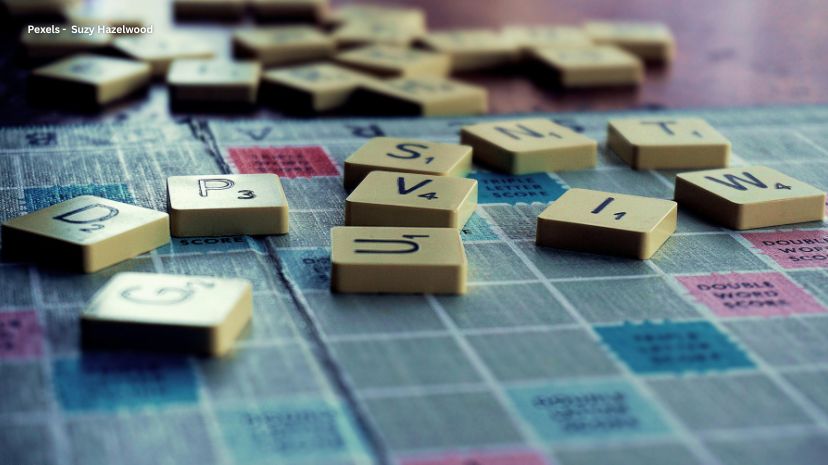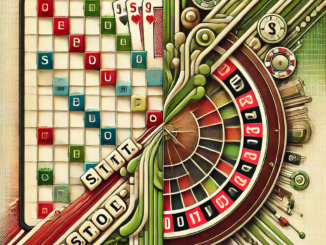Conceived by architect Alfred Butts in the 1930s, Scrabble initially bore the name “Lexiko” and underwent several iterations before evolving into the Scrabble we know today. Butts meticulously crafted the letter distribution based on frequency analysis of the New York Times, ensuring a delicate balance of challenge and accessibility.

In the early 1950s, entrepreneur James Brunot acquired the rights to Scrabble, sparking its meteoric rise to fame. The game gained widespread popularity during the 1950s and 1960s, becoming a mainstay in American households. Since then, Scrabble has transcended borders, languages, and cultures, spawning international tournaments and countless variants.
At its core, Scrabble is a deceptively simple game with profound strategic depth. Players draw seven letter tiles from a pool, each bearing a different letter and point value. The objective is to form words on a grid-based board, strategically placing tiles to maximize points and hinder opponents.
The game board consists of a 15×15 grid, with premium squares such as double and triple letters, and word score multipliers strategically scattered across its surface. These squares add layers of complexity, incentivizing players to strategically manoeuvre their tiles to capitalize on these bonuses.
Scrabble is a game of both skill and luck. While a robust vocabulary and strategic acumen are essential, the draw of letter tiles introduces an element of chance. Adapting to the tiles drawn is crucial, requiring players to balance long-term planning with adaptability—a delicate dance between strategy and serendipity.
Strategic players can mitigate the impact of luck in the game through techniques such as tile tracking, maintaining a balanced rack, and leveraging opportunities to block opponents or monopolize premium squares. This blend of luck and skill adds a layer of excitement and unpredictability to each game, ensuring that no two Scrabble matches are ever quite the same.
Whether you’re a seasoned Scrabble aficionado or a newcomer to the game, here are eight tips to enhance your gameplay:
Expand Your Vocabulary
Building a robust vocabulary is fundamental to success in Scrabble. Familiarise yourself with two and three-letter words, as they often provide opportunities for strategic plays. Additionally, focus on memorizing high-scoring words that utilize common letters like “Q,” “Z,” and “X.”
Strategise Your Tile Placement
Carefully consider where you place your tiles on the board to maximize your score. Aim to capitalize on premium squares, such as double and triple letters, and word score multipliers. Be mindful of potential opportunities to create multiple words with a single play.
Maintain a Balanced Rack
Strive to maintain a balanced rack of letters that allows for flexibility in creating words. Avoid hoarding high-value tiles at the expense of synergy with the rest of your tiles. Keeping a mix of vowels and consonants increases your chances of forming words on your turn.
Play Defensively
Anticipate your opponents’ potential moves and strategically block access to premium squares or high-scoring opportunities. Additionally, be cautious of leaving open triple word score squares that your opponents can exploit. Balancing offence with defence is key to maintaining control of the board.
Plan Ahead
Think several moves ahead and consider the potential consequences of each play. Anticipate how your current play will affect future opportunities for yourself and your opponents. Look for opportunities to set up future plays by strategically positioning your tiles.
Use Prefixes and Suffixes
Exploit the versatility of prefixes and suffixes to extend existing words on the board. Adding a prefix or suffix to an existing word can significantly increase your score while utilising fewer tiles. Look for opportunities to create compound words for maximum impact.
If you enjoy Scrabble, chances are you appreciate games that stimulate your intellect, creativity, or strategic thinking. Here’s a list of five other games you might enjoy:
Online Slots
While it may seem like an unexpected addition to this list, online slots offer a unique blend of chance and excitement that can appeal to fans of Scrabble’s unpredictable dynamics. With themes ranging from ancient civilizations to pop culture icons, online slots immerse players in immersive audiovisual experiences while offering the potential for substantial payouts.
While luck plays a significant role in determining outcomes, strategic decisions, such as bet size and game selection can influence players’ overall experience. Players should carefully review the pay tables and rules for each slot game, for example, to understand the payouts for different symbol combinations. Given that, online slots that pay real money provide a thrilling alternative for Scrabble enthusiasts seeking a change of pace, offering the potential for big wins.
Bananagrams
Similar to Scrabble, Bananagrams is a fast-paced word game where players race to create interconnected word grids. Instead of taking turns, players simultaneously draw letter tiles from a shared pool to create their own crossword-style arrangements. The game’s frenetic pace and emphasis on quick thinking make it a thrilling alternative to Scrabble.
Words With Friends
For those who enjoy Scrabble but prefer asynchronous gameplay, Words With Friends offers a digital platform to challenge friends or random opponents to word-building duels. Players take turns forming words on a virtual board, earning points based on tile values and strategic placement. With built-in chat features and a wide pool of opponents, Words With Friends offers a social and competitive experience reminiscent of Scrabble.
Quiddler
For those who appreciate the linguistic challenge of Scrabble but prefer a more compact and portable game, Quiddler offers a delightful solution. In this card game, players compete to form words using sets of letter cards with varying point values. Each round presents players with a new challenge, such as creating the longest word or forming words with specific letter combinations.
Quiddler’s blend of strategy and vocabulary-building makes it an accessible and engaging choice for word game enthusiasts of all ages.



Be the first to comment